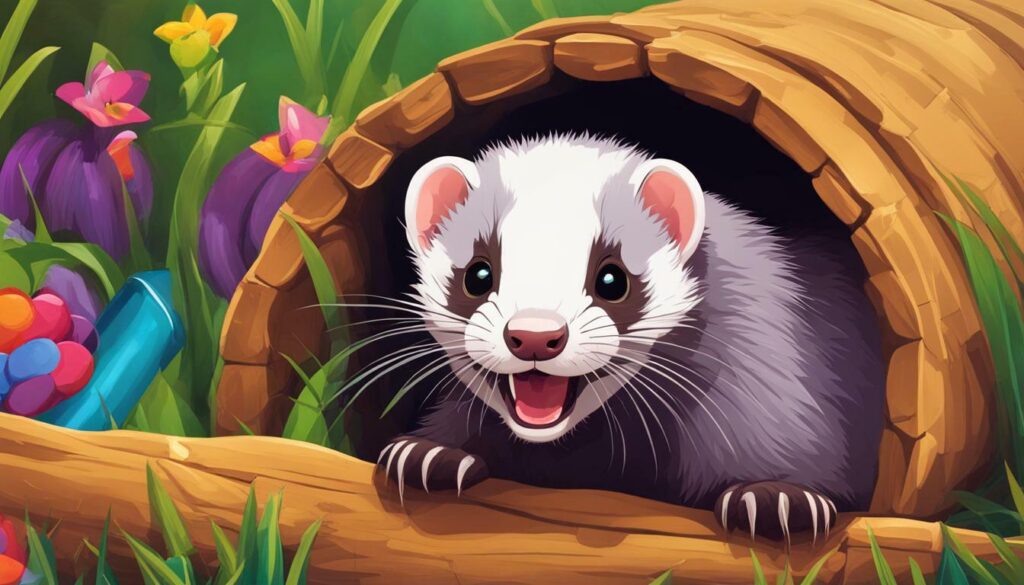Hamsters, like humans, require a well-balanced diet to thrive and stay healthy. As omnivores, hamsters have specific nutritional requirements that must be met to ensure their optimal health and well-being. Providing the right foods is crucial in supporting their growth, development, and overall vitality.
When it comes to hamster nutrition, it’s important to understand the specific nutritional needs of these small creatures. They require a diet that is high in protein, ranging from 15% to 25%, as well as carbohydrates, which should make up around 35% to 40% of their diet. Moderate amounts of fat, approximately 4% to 5%, and fiber at 5% should also be included in their daily intake.
Key Takeaways
- Hamsters need a well-balanced diet with the right proportions of protein, carbs, fat, and fiber.
- Commercially produced pelleted diets are recommended as the main source of food for hamsters.
- Fresh water should be provided daily in a bottle with a stainless steel sipper tube.
- Treats for hamsters can include sugarless breakfast cereals, greens, seeds, carrots, and more.
- Avoid dried fruits and vegetables due to their high sugar content.
Understanding Hamster Nutrition
Hamsters have specific nutritional requirements that must be met to ensure their optimal health and vitality. These adorable little creatures are classified as omnivores, meaning they require a balanced diet that includes a mix of protein, carbohydrates, fat, and fiber. Providing the right nutrition for your hamster is essential for their overall well-being.
When it comes to protein, hamsters need a diet that contains 15-25% protein. This nutrient is crucial for muscle development, tissue repair, and overall growth. Good sources of protein for hamsters include high-quality commercial pelleted rodent diets, which are specially formulated to meet their nutritional needs.
Carbohydrates are another vital component of a hamster’s diet, comprising around 35-40% of their daily intake. Carbs provide the necessary energy for hamsters to stay active and healthy. Alongside protein and carbohydrates, hamsters also require a moderate amount of fat (4-5%) to support their organ function and maintain healthy skin and fur.
Fiber is an essential part of a hamster’s diet and should make up around 5% of their daily intake. Fiber aids digestion and helps prevent digestive issues, such as constipation. Good sources of dietary fiber for hamsters include hay, fresh greens, and certain vegetables.
Providing a well-balanced diet that meets these nutritional requirements is crucial for your hamster’s overall health. It’s important to consult with a veterinarian to ensure you are feeding your hamster the right amount of each nutrient and to address any specific dietary concerns based on your hamster’s age, breed, and individual needs.
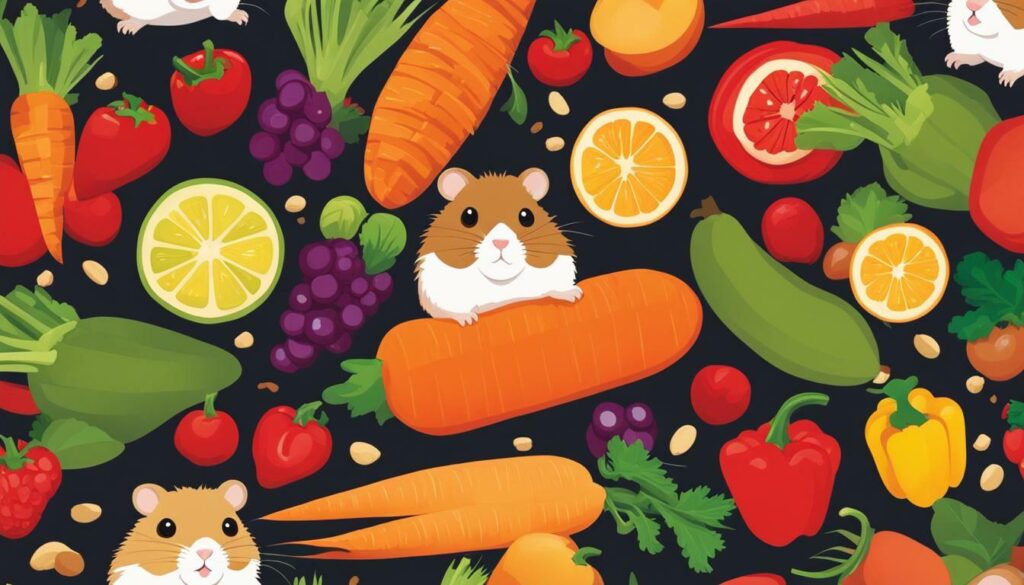
| Nutrient | Recommended Percentage | Sources |
|---|---|---|
| Protein | 15-25% | Commercial pelleted diets, insects, seeds |
| Carbohydrates | 35-40% | Fruits, vegetables, grains |
| Fat | 4-5% | Nuts, seeds, oils |
| Fiber | 5% | Hay, fresh greens, certain vegetables |
Remember, a well-nourished hamster is a healthy and happy hamster. By providing the right balance of nutrients and consulting with a veterinarian, you can ensure that your furry friend receives the optimal nutrition they need to thrive.
Commercial Pelleted Diets for Hamsters
The most reliable source of nutrition for hamsters is commercially produced pelleted rodent diets. These diets are specially formulated to meet the specific nutritional needs of hamsters, providing a well-balanced combination of essential nutrients. The pellets are designed to be easily digestible and contain the right proportions of protein, carbohydrates, fat, and fiber, ensuring optimal health for your furry friend.
One of the key benefits of using commercial pelleted diets is their convenience. These diets come in pre-measured portions, making it easy to feed your hamster the right amount of food each day without the risk of overfeeding or underfeeding. This is particularly important as hamsters have small stomachs and can easily become obese if given excessive amounts of food.
Additionally, commercial pelleted diets are formulated to promote dental health. The pellets are hard and require chewing, which helps prevent dental problems such as overgrowth of teeth. Chewing on the pellets also provides mental stimulation for your hamster, keeping them entertained and engaged.
| Nutrient | Recommended Range |
|---|---|
| Protein | 15-25% |
| Carbohydrates | 35-40% |
| Fat | 4-5% |
| Fiber | 5% |
It’s important to note that while commercial pelleted diets should be the main source of food for hamsters, a small amount of seed-based diets can be given as a supplement. However, it’s crucial to monitor the intake of seed diets as they are higher in fat and can lead to obesity if overfed. Consult with a veterinarian to determine the appropriate ratio of pelleted and seed-based diets for your hamster’s specific needs.
In summary, commercially produced pelleted rodent diets provide a convenient and nutritionally complete option for feeding your hamster. These diets offer the ideal balance of protein, carbohydrates, fat, and fiber, promoting overall health and well-being. Remember to always provide fresh water and consult with a veterinarian for tailored dietary advice to ensure your hamster receives the best possible nutrition.
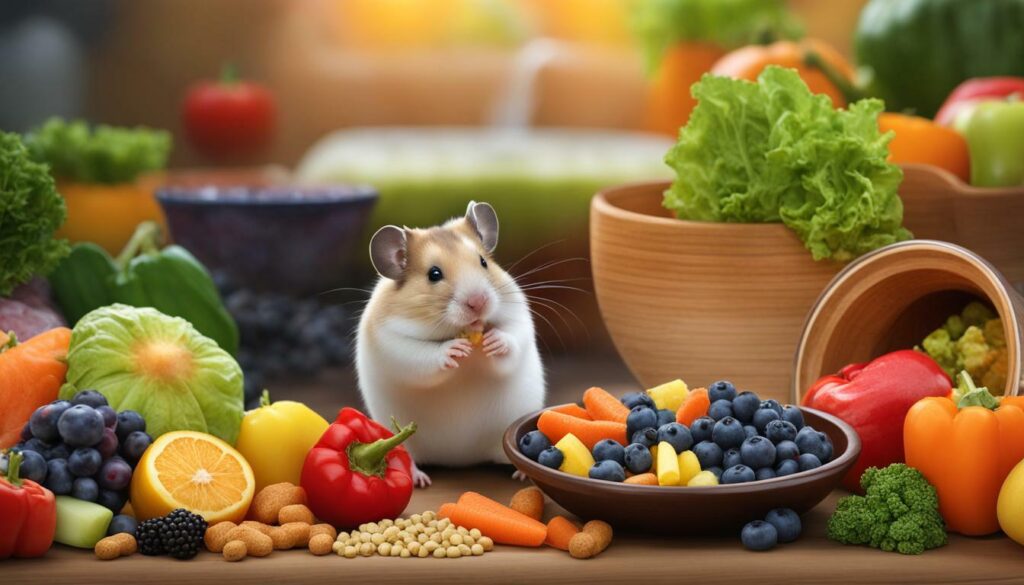
“Proper portion control is essential when feeding hamsters. It’s important to follow the recommended feeding guidelines provided on the packaging of commercial pelleted diets. Overfeeding can lead to obesity and related health issues, while underfeeding can result in malnutrition. Always monitor your hamster’s weight and adjust the portion size accordingly.” – Dr. Emily Johnson, Small Animal Veterinarian
The Importance of Fresh Water
Keeping your hamster well-hydrated is crucial for their overall health, and fresh water should always be readily available. Hamsters need access to clean water at all times to maintain proper hydration. A bottle with a stainless steel sipper tube is recommended as it helps prevent contamination and allows for easy drinking.
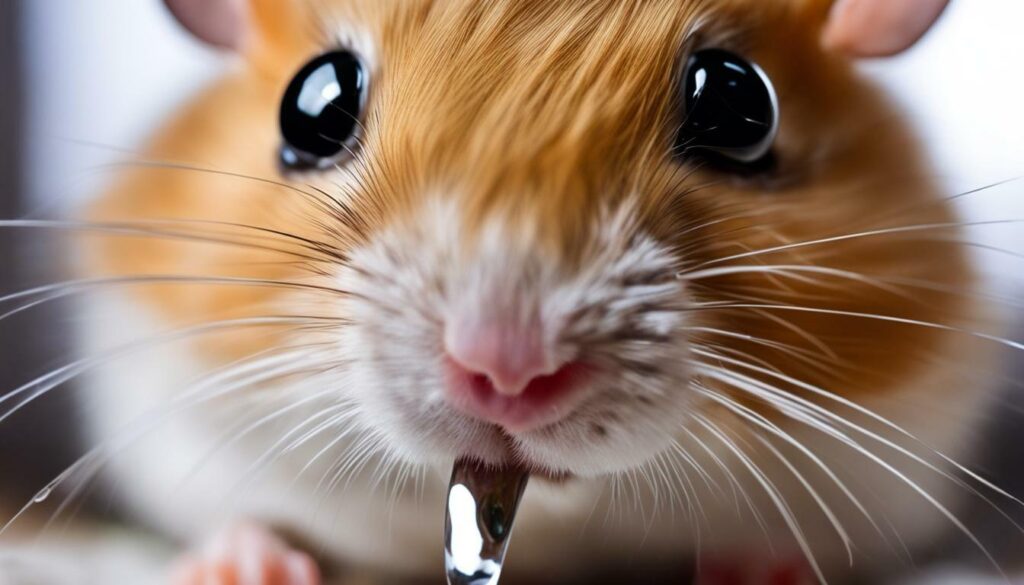
It’s important to regularly check the water bottle and sipper tube to ensure they are functioning properly and free of any blockages. The water should be changed daily to maintain freshness and prevent the growth of bacteria. It’s recommended to rinse the water bottle and sipper tube with hot water and mild soap regularly to keep them clean.
In addition to providing fresh water, it’s important to monitor your hamster’s water intake. If you notice a decrease in their water consumption or any signs of dehydration such as dry skin, lethargy, or sunken eyes, it’s crucial to consult with a veterinarian to rule out any underlying health issues.
The Benefits of Stainless Steel Sipper Tubes
The use of stainless steel sipper tubes for water bottles offers several advantages over other materials. Stainless steel is durable, non-toxic, and resistant to rust and corrosion. This makes it a safe and hygienic option for your hamster’s water source. Additionally, the narrow tube design prevents spillage and reduces the risk of bacteria entering the water.
Ensure that the sipper tube is positioned at a suitable height in the cage, so your hamster can easily access the water without straining or being unable to reach it. Regularly check the tube for any signs of wear and replace it if necessary to maintain the water bottle’s functionality.
By providing fresh water with a stainless steel sipper tube, you are ensuring that your hamster remains properly hydrated, promoting their overall well-being and preventing potential health issues associated with dehydration.
Treats for Hamsters
While hamsters primarily require a balanced hamster diet, they can enjoy small amounts of certain human foods as an occasional treat. Offering treats can provide mental stimulation and variety in their diet, but it’s crucial to choose the right foods to ensure their health and well-being. Here are some safe and nutritious options:
1. Sugarless Breakfast Cereals or Grains
Hamsters can enjoy a small amount of sugarless breakfast cereals or grains as a special treat. These include unsweetened whole grain cereals like plain Cheerios or oats. Just remember to avoid cereals with added sugar or artificial sweeteners, as these can be harmful to your furry friend.
2. Greens
Green leafy vegetables like spinach, kale, or lettuce can be given to hamsters in moderation. These provide essential vitamins and minerals. It’s important to thoroughly wash the greens and remove any pesticides or dirt before offering them to your hamster.
3. Seeds
Hamsters naturally eat seeds in the wild, so small amounts of seeds like pumpkin seeds, sunflower seeds, or chia seeds can be given as occasional treats. However, it’s crucial to remember that seeds should only be provided as supplements to their main diet, which should consist of commercially produced pelleted rodent food.
4. Fruits and Vegetables
Hamsters can also enjoy small amounts of fruits and vegetables as treats. Some safe options include sliced carrots, apple slices (without seeds), raisins, peas, bell peppers, and cucumbers. It’s important to note that these should be given in moderation due to their natural sugar content. Avoid feeding dried fruits or vegetables, as they can be high in sugar and preservatives.
Remember, treats should only make up a small portion of your hamster’s diet. It’s crucial to provide a well-balanced and nutritionally complete diet using commercially produced pelleted rodent food as the main source of nutrition. Always consult with a veterinarian for specific dietary recommendations based on your hamster’s unique needs.
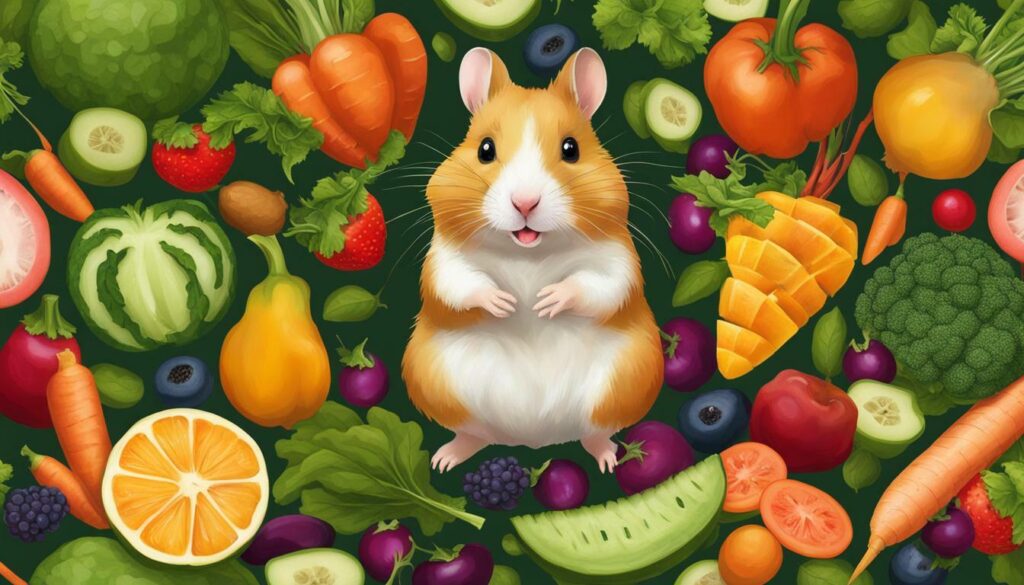
It’s crucial to be cautious when feeding dried fruits and vegetables to hamsters due to their high sugar levels. While hamsters can enjoy a variety of fresh fruits and vegetables as part of a balanced diet, dried versions should be avoided. Drying fruits and vegetables removes the water content and concentrates the natural sugars, making them much sweeter than their fresh counterparts. This excessive sugar intake can lead to health complications for your furry friend.
Hamsters have small bodies and metabolisms that are not designed to handle high levels of sugar. Consuming too much sugar can cause obesity, dental issues, and even diabetes in hamsters. It’s important to prioritize their health by providing them with nutritious foods and avoiding those that can harm them.
To ensure your hamster’s well-being, opt for fresh fruits and vegetables instead. These contain a range of essential vitamins and minerals, as well as fiber, which aids in digestion. Some examples of hamster-friendly fruits and vegetables include carrots, apples, peas, peppers, and cucumbers. These can be given in small quantities alongside their main diet of commercially produced pelleted rodent food.
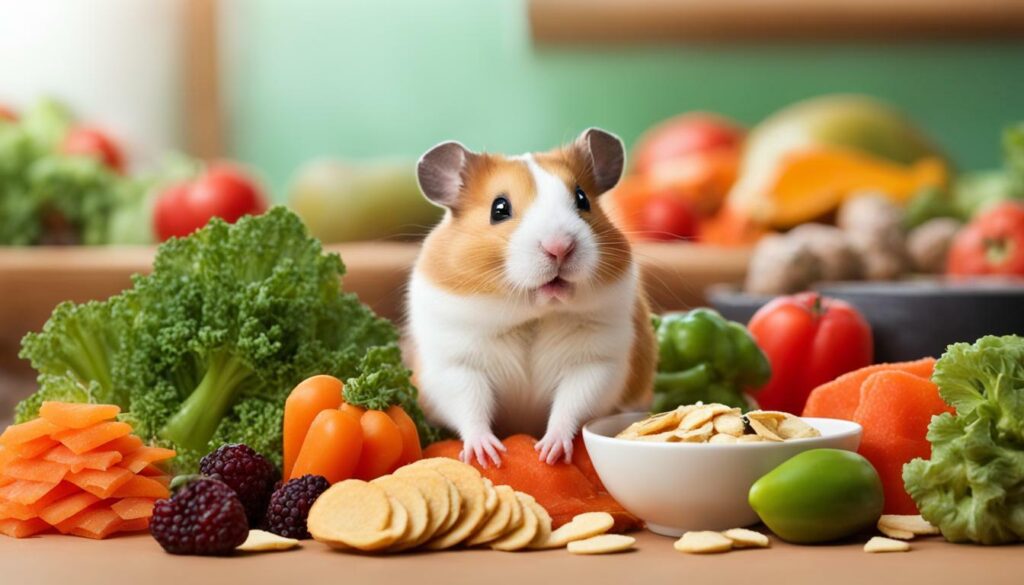
Remember, maintaining a well-balanced diet is key to promoting your hamster’s health and longevity. By avoiding dried fruits and vegetables, you can ensure that your furry friend receives the necessary nutrients without the risks associated with excessive sugar intake. If you have any concerns or questions about your hamster’s diet, it’s always a good idea to consult with a veterinarian who specializes in small animals.
Preventing Nutritional Deficiencies
A well-balanced diet is essential for hamsters to prevent nutritional deficiencies and maintain their overall health and vitality. Hamsters are classified as omnivores and have specific nutritional requirements that must be met in their diet. Proper nutrition is crucial to ensure that they receive all the necessary nutrients for optimal growth, development, and immune function.
Hamsters require a diet that is high in protein, carbohydrates, moderate in fat, and contains an adequate amount of fiber. Protein is essential for building and repairing tissues, while carbohydrates provide energy for their daily activities. On the other hand, fat is needed for healthy skin and coat, and fiber promotes digestive health and prevents gastrointestinal issues.
To meet these nutritional needs, commercially produced pelleted rodent diets are recommended as the main source of food for hamsters. These pellets are formulated to provide a balanced combination of protein, carbohydrates, fat, and fiber. It’s important to choose high-quality pellets that are specifically designed for hamsters to ensure they receive the right nutrients in the proper proportions.
“Providing a well-balanced diet is crucial to prevent hamsters from developing nutritional deficiencies, which can lead to health problems.”
In addition to pelleted diets, hamsters can also be fed small amounts of human foods as treats. Sugarless breakfast cereals or grains, greens, seeds, carrots, apples, raisins, peas, pepper, and cucumbers are some examples of safe and healthy treats for hamsters. However, it’s important to avoid dried fruits and vegetables due to their high sugar content, which can be harmful to hamsters.
By providing a well-balanced diet that meets their nutritional needs, hamsters can thrive and enjoy a long and healthy life. It’s always a good idea to consult with a veterinarian for specific dietary recommendations and to ensure that your hamster’s nutritional needs are being met. Remember, proper nutrition is the key to keeping your furry friend happy and in optimal health.
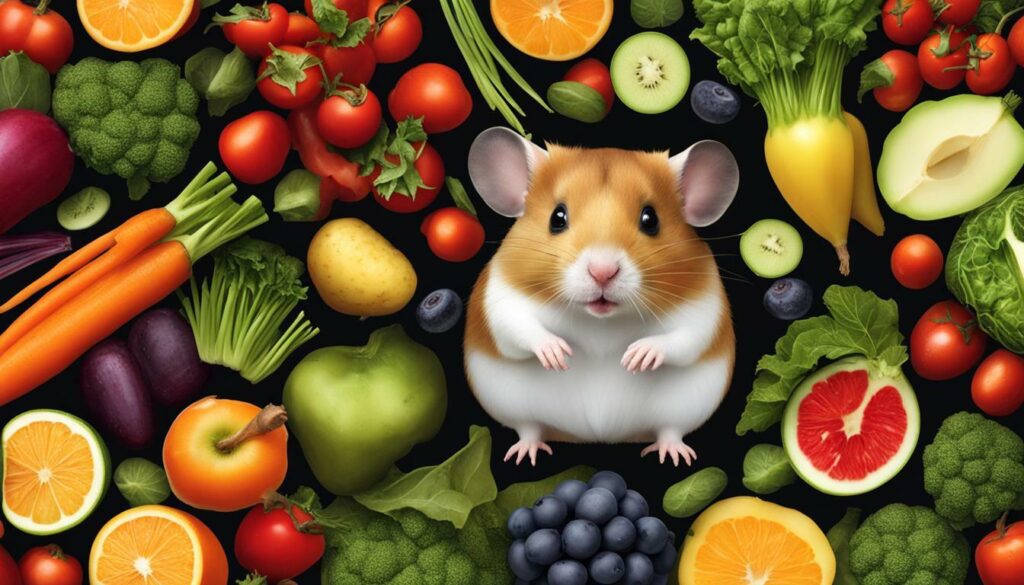
| Nutrient | Recommended Range (%) |
|---|---|
| Protein | 15-25 |
| Carbohydrates | 35-40 |
| Fat | 4-5 |
| Fiber | 5 |
Expert Tips for Hamster Nutrition
To ensure your hamster receives the best possible nutrition, follow these expert tips and guidelines for their dietary needs. It’s important to provide a well-balanced diet that meets their specific nutritional requirements. Here are some key tips to keep in mind:
- Variety is key: Offer a variety of foods to provide a range of essential nutrients. This can include commercially produced pelleted diets, fresh vegetables, and occasional treats.
- Portion control: Hamsters have small stomachs, so it’s important to feed them appropriate portion sizes. A good rule of thumb is to offer a tablespoon of food per day, divided into two meals.
- Consult with a veterinarian: If you have any concerns about your hamster’s diet or nutritional needs, consult with a veterinarian who specializes in small animals. They can provide personalized advice based on your hamster’s specific requirements.
- Avoid overfeeding treats: While treats can be a fun addition to your hamster’s diet, it’s important not to overdo it. Too many treats can lead to weight gain and potential health problems. Stick to small amounts and limit them to once or twice a week.
- Monitor water intake: Ensure your hamster has access to fresh water at all times. Regularly check the water bottle or bowl to make sure it’s clean and functioning properly.
“A balanced and varied diet is essential for the health and well-being of your hamster. Providing a mix of commercially produced pelleted diets, fresh vegetables, and occasional treats can help meet their nutritional requirements. Remember to consult with a veterinarian for expert advice tailored to your hamster’s specific needs.”
By following these expert tips, you can ensure that your hamster is receiving the proper nutrition to support their overall health and longevity. Remember to provide a clean living environment, exercise opportunities, and mental stimulation to create a healthy and happy habitat for your furry friend.
Summary:
To nurture your hamster’s health through nutrition, remember to provide a well-balanced and varied diet, consult with a veterinarian if needed, practice portion control, monitor water intake, and avoid overfeeding treats. By following these expert tips, you can ensure your hamster thrives and lives a long, happy life.
Related Image:
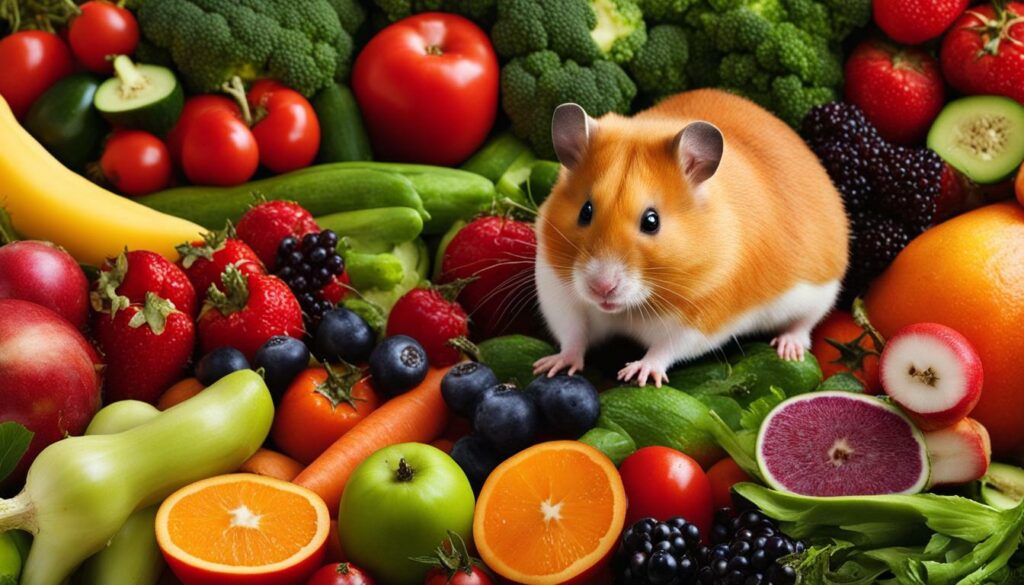
Alongside proper nutrition, a healthy habitat is crucial for your hamster’s overall well-being. Providing your furry friend with a comfortable and stimulating environment not only enhances their physical health but also promotes mental stimulation and happiness. Here are some essential tips to create a healthy and fulfilling habitat for your hamster.
1. Cage Size and Design
Hamsters are active creatures that require ample space to exercise and explore. Ensure that the cage you choose is spacious enough for your hamster to move around comfortably. The recommended minimum size for a hamster cage is 360 square inches. Opt for a wire cage with narrow spacing to prevent any chance of escape.
Additionally, enrich the cage with various accessories such as tunnels, ramps, and platforms to encourage physical activity and provide mental stimulation. Hamsters love to burrow, so adding bedding material like aspen shavings or paper-based bedding will allow them to engage in their natural behavior.
2. Exercise Opportunities
Hamsters are energetic creatures that need regular exercise to maintain their physical well-being. Provide them with a hamster wheel to run on, ensuring it is appropriately sized to prevent any potential injuries. Additionally, floor time outside the cage in a safe and supervised area can offer them a change of scenery and additional exercise.
3. Mental Stimulation
Keeping your hamster mentally stimulated is just as important as their physical exercise. Provide them with a variety of toys and chewables to keep their minds active and prevent boredom. Hamsters love to explore, so providing hiding spots, tunnels, and interactive toys will keep them engaged and content.
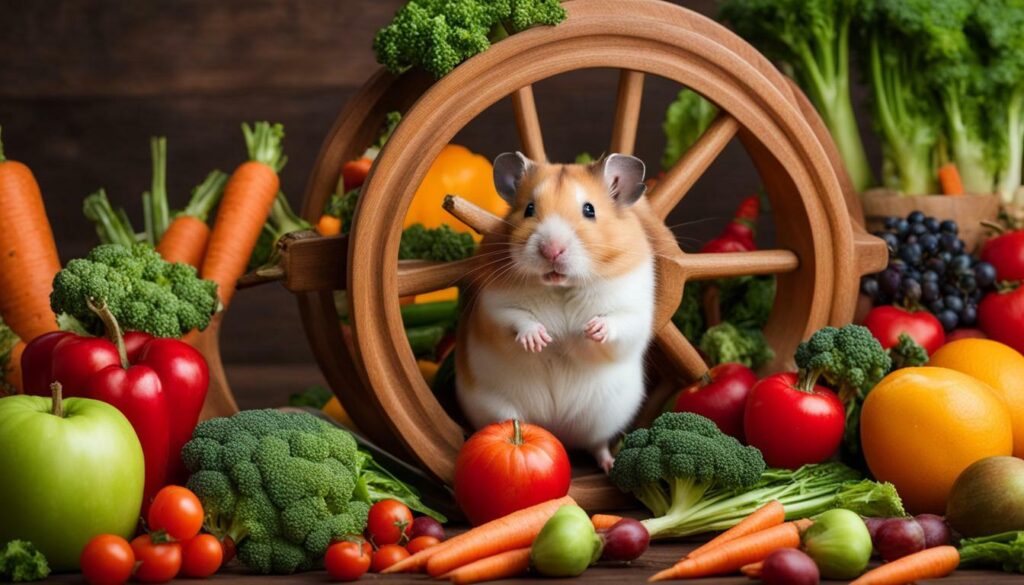
4. Maintenance and Hygiene
Regularly clean your hamster’s cage to maintain a hygienic environment. Remove any soiled bedding, uneaten food, and clean the water bottle and food bowls daily. It’s important to keep the cage clean and odor-free to prevent the buildup of bacteria or unpleasant smells.
Remember to wash your hands before and after handling your hamster to avoid transferring any harmful bacteria or germs. A clean and well-maintained habitat will ensure your hamster’s optimal health and longevity.
| Essential Elements of a Healthy Hamster Habitat | Do’s | Don’ts |
|---|---|---|
| Spacious cage with appropriate bedding | Regular exercise opportunities | Avoid using cedar or pine shavings as bedding material |
| Enrichment toys and accessories | Mental stimulation through interactive toys | Avoid overcrowding the cage with unnecessary items |
| Regular maintenance and cleaning | Hygienic environment | Avoid using wire wheels or toys that could potentially injure your hamster |
By following these tips, you can ensure that your hamster enjoys a happy and healthy life in their habitat. Remember, a well-balanced diet and a nurturing environment go hand in hand to promote the overall well-being of your furry friend.
Conclusion – Nurturing Your Hamster’s Health through Nutrition
By prioritizing and understanding hamster nutrition, you can ensure that your furry friend enjoys a healthy and fulfilling life. Hamsters are classified as omnivores and have specific nutritional requirements that need to be met in order to support their overall well-being.
It is important to provide hamsters with a diet that is high in protein, carbohydrates, moderate in fat, and fiber. Commercially produced pelleted rodent diets are recommended as the main source of food, as they are specially formulated to meet their nutritional needs. Seed diets should only be used as supplements, as they lack essential nutrients.
Additionally, fresh water should be available to hamsters at all times. Using a bottle with a stainless steel sipper tube ensures that the water remains clean and easily accessible. Hydration is crucial for their health and helps with digestion.
While hamsters can enjoy small amounts of human foods as treats, it’s important to avoid dried fruits and vegetables due to their high sugar content. Opt for sugarless breakfast cereals or grains, greens, seeds, carrots, apples, raisins, peas, pepper, and cucumbers as occasional treats instead.
Feeding hamsters a well-balanced diet is essential to prevent nutritional deficiencies and potential health problems. It’s a good idea to consult with a veterinarian for expert advice and ensure you are providing the best nutrition for your hamster’s specific needs.
By following these guidelines and providing a healthy habitat with a clean living environment, exercise opportunities, and mental stimulation, you can help nurture your hamster’s health and promote a long and happy life.
FAQ
Q: What are the nutritional requirements for hamsters?
A: Hamsters require a diet high in protein (15-25%), carbohydrates (35-40%), moderate fat (4-5%), and fiber (5%).
Q: What should be the main source of food for hamsters?
A: Commercially produced pelleted rodent diets are recommended as the main source of food for hamsters.
Q: Can hamsters be fed human foods as treats?
A: Yes, hamsters can be fed small amounts of human foods as treats, including sugarless breakfast cereals or grains, greens, seeds, carrots, apples, raisins, peas, pepper, and cucumbers.
Q: What human foods should be avoided in a hamster’s diet?
A: Dried fruits and vegetables should be avoided due to their high sugar content.
Q: Why is a well-balanced diet important for hamsters?
A: A well-balanced diet is important to prevent nutritional deficiencies and health problems in hamsters.






